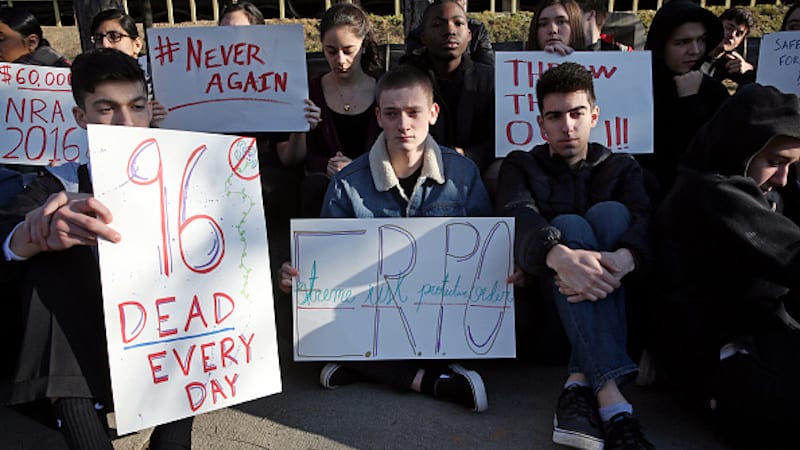BAN ASSAULT WEAPONS
I’m staring down at these words on a t-shirt while sitting at my kitchen table, fighting back tears. I bought the shirt to wear on March 14th for the National School Walkout. Taking part in that demonstration seemed like an obvious response. Spending 17 minutes out of the school day does not seem like too much to honor 17 lost lives. It is the perfect protest, and the t-shirt would further convey my stance. I want my students to know where I stand.
Now I am not sure what the right answer is. As I have read about how different schools are responding, I find I have lots of questions. Is it my place to take part in a protest during school hours? Am I unwittingly using my influence as a teacher to push my own agenda on students? Should I be doing exactly that for the safety of my students? Am I endangering students by encouraging them to participate in a walk out that a troubled student might target? After 20 years of teaching, I don’t have the answer.
What I’ve learned about the protest.
The National School Walk Out on March 14th is being spearheaded by the outspoken students of Stoneman Douglas and the Women’s March Youth EMPOWER organization. They are calling upon “students, teachers, school administrators, parents and allies to take part in a #NationalSchoolWalkout for 17 minutes at 10 AM across every time zone on March 14, 2018 to protest Congress’ inaction to do more than tweet thoughts and prayers in response to the gun violence plaguing our schools and neighborhoods.
“Students and staff,” the page continues, “have the right to teach and learn in an environment free from the worry of being gunned down in their classrooms or on their way home from school. Parents have the right to send their kids to school in the mornings and see them home alive at the end of the day.”
The page goes on to explain that this protest is meant to spur Congress to action. It concludes with a reference to the voting potential of a highly mobilized youth base across this country demanding change.
Here’s how schools are responding.
School administrators are trying to figure out the logistics and potential dangers of students exiting the building en masse. Teachers are trying to figure out the ethical and professional ramifications of walking out. Students are also trying to weigh their options.
Some schools, like Needville High School in Texas, are preemptively warning students not to walk out. “A school is a place to learn and grow educationally, emotionally and morally,” Needville Superintendent Curtis Rhodes explained. “A disruption of the school,” he continued, “will not be tolerated…We are here for an education, not a political protest.” Students and faculty who want to protest must now make a difficult decision.
Other schools are sending the message to students that this is an important moment and students who want to have their voices heard should. The leadership of a local New Jersey school has told students, “we will hold the doors open for you.” The Action Network’s web page displays a map of hundreds of registered school protests across the country and beyond. But, the plans for March 14th are unclear at lots of schools still trying to process and figure out a proper response.
Several colleges and universities have made statements to address prospective students. Massachusetts Institute of Technology has issued a statement to put applicants and future students at ease. “Some students who have been admitted to MIT’s Class of 2022 have asked us if their acceptance will be rescinded if they are disciplined for joining the protests,” the statement reads. “Other applicants still under consideration are wondering if they have to choose between speaking out and getting in. In this case, a disciplinary action associated with meaningful, peaceful participation in a protest will not negatively impact their admissions decision.”
So what now?
I still haven’t figured out what I will do that day. Part of me wants to throw on my t-shirt and walk out of those doors. Another part of me wants to save that protest for outside of the school day, telling my students who decide to protest that I support them while simultaneously supporting my students who don’t want to protest.
These are questions educators across the country are wrestling with in the days leading up to March 14th. I think they will be questions we will face for some time.
We would love to hear what you are thinking, what your schools are planning, and what your students are doing. Come and share your thoughts on the National School Walkout in our WeAreTeachers HELPLINE group on Facebook.

